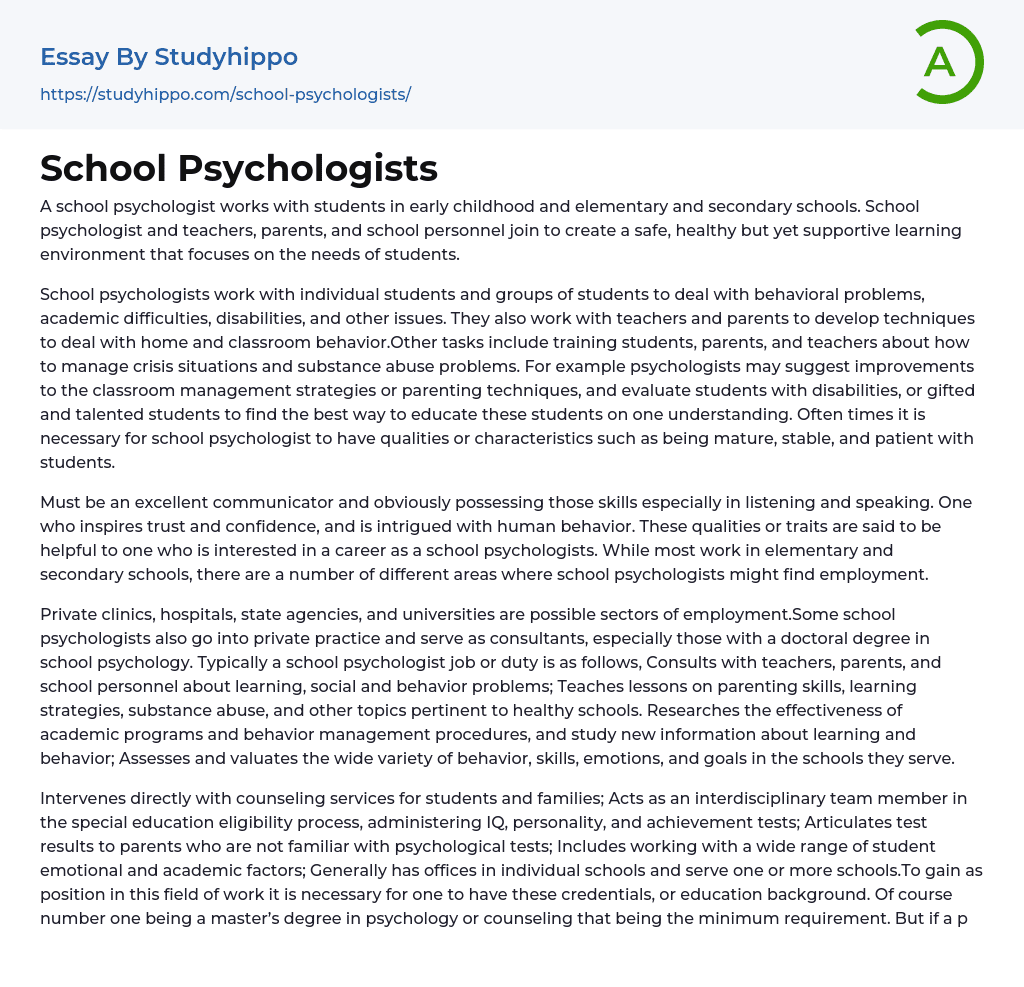Working alongside teachers, parents, and school staff, a school psychologist aims to establish a secure and encouraging learning atmosphere tailored to students' requirements. They assist both individual and group students in tackling behavioral obstacles, academic struggles, disabilities, and various other concerns. Moreover, they collaborate with teachers and parents to devise effective approaches for managing behavior within the classroom as well as at home. Additionally, they offer guidance on crisis management and substance abuse prevention to students, parents, and educators.
Psychologists who work in schools can provide support for enhancing classroom management strategies and parenting techniques, as well as assessing students with disabilities or those who are gifted and talented to determine the most successful educational approach. School psychologists typically demonstrate qualities such as maturity, stability, and patience when interacting with students. Effective communication skills, especially in listening and speaking,
...are also essential. Furthermore, inspiring trust and confidence in others while being fascinated by human behavior are crucial attributes for individuals aspiring to become school psychologists.
School psychologists have employment opportunities in various sectors such as private clinics, hospitals, state agencies, and universities in addition to working in elementary and secondary schools. Some school psychologists with a doctoral degree may also choose to work in private practice or serve as consultants.
The responsibilities of a school psychologist typically include consulting with teachers, parents, and school personnel on issues related to learning, socializing, and behavior. They may also provide instruction on parenting skills, learning strategies, substance abuse prevention, and other relevant topics.
Furthermore, they stay updated with new information about learning and behavior while conducting research on the effectiveness of academic programs and behavior management techniques. Additionally they assess & evaluat
a wide range of behaviors ,skills ,emotions & goals within the schools they serve.
School psychologists offer counseling services directly to students and families as part of an interdisciplinary team. They administer IQ, personality, and achievement tests during the special education eligibility process, communicating the results to parents unfamiliar with psychological assessments. These professionals address emotional and academic challenges faced by students. Typically stationed at individual schools, school psychologists may also serve multiple schools.
To pursue a career in this field, it is essential to have appropriate credentials and educational background. While most states require a master's degree in psychology or counseling as a minimum requirement, Hawaii and Maine mandate a doctorate degree. In Massachusetts, Nebraska, New Jersey, and Pennsylvania, individuals with a bachelor's degree can become school psychologists if they complete the necessary internship hours. However, each state has its own specific requirements for school psychologists.
Currently, 18 states enforce national certification for school psychologists which entails completing an internship in school psychology. It is important to verify your state's specific licensing prerequisites before selecting a graduate program in school psychology.
In order to work as a school psychologist, individuals need to acquire certification and/or licensure from their state. The National Association of School Psychologists provides national certification, which entails completing a master's degree program, 30 graduate semester hours, a supervised internship, and passing the National School Psychology Examination. Numerous colleges and universities in the United States offer programs in school psychology where students study human behavior analysis, behavior disorders, ethics, interviewing techniques, testing methods, personality assessment, and childhood/adolescent psychopathology. It is important to mention that school psychology is a relatively new profession.
The National Association of School Psychology
(NASP) was established in 1968 and obtained recognition as a doctoral specialty from the American Psychological Association (APA). In 2002, U.S. News and World Report recognized school psychology as one of the top ten "hot professions". The retirement of seasoned school psychologists has led to an increasing demand for skilled professionals in this field.
The job outlook for psychologists is positive, with opportunities for advancement. Employment in all areas of psychology is projected to grow faster than the average rate for all occupations by 2005. School psychologists are expected to see an increase in demand as more students seek assistance with challenges like family conflicts, crime, substance abuse, and other issues. Those who have earned doctoral degrees can explore positions as administrators within large school systems or districts, as well as state-level education roles. For information on earnings, consult the U.S. Occupational Outlook Handbook.
According to the Department of Labor, the average salary for a psychologist working in an elementary or secondary school is typically $58,360. Reschly and Wilson's (1995) research shows that school psychologists in faculty roles earn an average salary of $57,000. Those with a doctoral degree in school psychology have an average annual salary of $51,000, while those with a master's degree earn approximately $40,000 per year.
Psychologists not only receive salaries but also engage in various activities such as working with individuals, establishing connections, and providing solace. Similar occupations that entail similar responsibilities include clergy members, counselors, human resources professionals,
training and labor relations managers and specialists,
social workers, sociologists,
political scientists as well as special education teachers.
- Interpretation essays
- Plagiarism essays
- Analogy essays
- Learning English essays
- School Types essays
- Coaching essays
- Critical Thinking essays
- homework essays
- Learning essays
- Library essays
- Listening essays
- Literacy essays
- Mentor essays
- Physical Education essays
- Project essays
- Reading essays
- Research essays
- Sex Education essays
- Social Studies essays
- Standardized Testing essays
- Study Plan essays
- Teaching essays
- Classroom essays
- College essays
- E-Learning essays
- Elementary School essays
- Examination essays
- Graduate School essays
- High School essays
- History Of Education essays
- Homeschooling essays
- Kindergarten essays
- Middle School essays
- Public School essays
- School essays
- Single Sex Schools essays
- Special Education essays
- Student essays
- Teacher essays
- University essays
- Vocational Education essays




